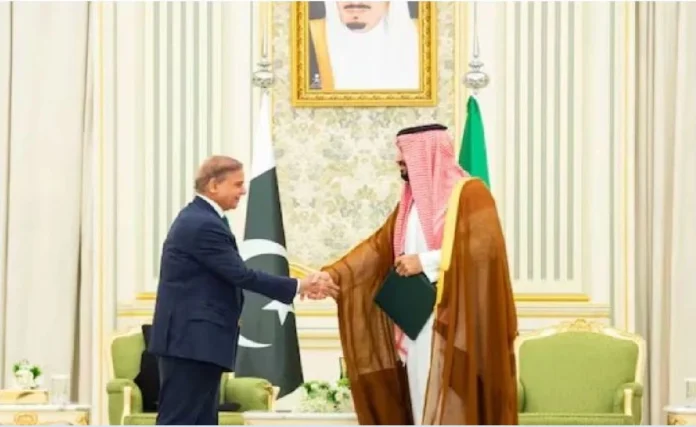
By Annunthra Rangan
On September 17, 2025, Saudi Arabia and Pakistan signed a Strategic Mutual Defence Agreement that declares: “any aggression against either country shall be considered an aggression against both.” The pact institutionalises closer military ties through joint committees, intelligence-sharing, and the prospect of large-scale exercises. It has already prompted speculation about extended deterrence and Pakistan’s nuclear role in Gulf security.
While the compact is consequential, its immediate operational impact against India is tempered by political, legal, and military realities.
MUTUAL DEFENCE—BUT WITH AMBIGUITIES
Public statements stress solidarity and the creation of permanent coordination mechanisms. Yet neither Riyadh nor Islamabad published a full treaty text, leaving crucial details—such as thresholds for invoking the pact, decision-making processes, command arrangements, and nuclear exclusions—undisclosed.
Pakistani officials have hinted that their nuclear deterrent could be “made available” to Saudi Arabia, sparking alarm. But the absence of legal instruments transferring control, combined with non-proliferation obligations and international scrutiny, makes an operational nuclear umbrella improbable.
CHINA IN THE BACKGROUND
Although not a signatory, China’s strategic presence looms large. Beijing maintains deep economic ties with Riyadh and longstanding defence cooperation with Islamabad. The pact reflects a wider shift towards non-Western security architectures, giving Beijing another lever in Gulf and South Asian diplomacy—even if there is no evidence it negotiated the agreement.
RIYADH’S BALANCING ACT
For Saudi Arabia, the pact represents both opportunity and risk. By formalising its defence ties with Pakistan, Riyadh gains leverage in regional politics. Yet, it also continues to rely heavily on India for energy revenues, trade, and the welfare of millions of Indian expatriates. Official rhetoric suggests Riyadh hopes to compartmentalise relations—deepening military alignment with Islamabad while ring-fencing its economic and political ties with New Delhi.
Such compartmentalisation, however, is fragile. Any crisis in which Pakistan invokes the pact could force Riyadh into awkward choices, straining its delicate balance between South Asia’s rivals.
INDIA’S CONCERNS
For New Delhi, the pact is a shift in optics and substance. Saudi Arabia, once assumed neutral in South Asian rivalries, has now formally aligned with Pakistan. This unsettles India’s Gulf calculus and could complicate counterterrorism cooperation, intelligence-sharing, and energy diplomacy.
The agreement also strengthens Riyadh’s bargaining power. Saudi Arabia has historically used its ties with Pakistan as a diplomatic card; now, formalising this alignment enhances its leverage over India on economic and political issues.
THE RED LINE QUESTION
Could the pact draw Riyadh into conflict if India conducted a limited strike against Pakistan-based terror camps? Legally and politically, that seems unlikely. The pact lacks NATO-style operational protocols, and Riyadh would weigh its economic and strategic ties with India before acting. India could also invoke Article 51 of the UN Charter to frame such actions as self-defence.
Still, even limited strikes could trigger diplomatic backlash—symbolic gestures like recalling ambassadors or pausing defence engagement. More troubling is the psychological effect on Pakistan: emboldened by the perception of a Saudi security shield, Islamabad may lean harder on proxies and asymmetric tactics, raising escalation risks.
THE NUCLEAR SHADOW
Though analysts judge a nuclear umbrella improbable, even the suggestion destabilises crisis management. Rhetoric about nuclear sharing adds uncertainty, potentially emboldening Pakistan while unsettling regional deterrence dynamics.
A CALIBRATED INDIAN RESPONSE
India’s best strategy lies in engagement, not alarm. New Delhi must reinforce diplomacy with Riyadh, highlight shared energy and diaspora interests, and seek clarity on the pact’s limits. At the same time, it should harden counterterrorism channels, safeguard intelligence flows, and stress its legal right to self-defence under international law. Working with partners in Washington, Brussels, and the Gulf will be critical to setting norms that contain proliferation risks.
Ultimately, the Saudi-Pakistan pact elevates Islamabad’s standing and introduces new uncertainties. Yet, Saudi Arabia’s economic interdependence with India and the high costs of direct confrontation suggest the agreement will serve more as political signalling than a war trigger. For New Delhi, the challenge is to treat the pact as an early warning, adapt policy, and ensure rhetoric does not harden into practical constraints on its security choices.
—The writer is a Senior Research Officer at Chennai Centre for China Studies. Her research interests constitute China-WANA (West Asia and North Africa) relations and human rights

